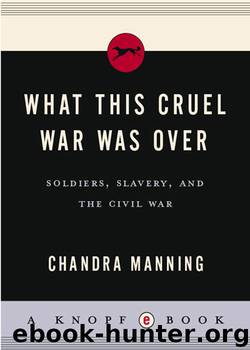What This Cruel War Was Over by Chandra Manning

Author:Chandra Manning [Manning, Chandra]
Language: eng
Format: epub
ISBN: 9780307267436
Google: dbj1uAEACAAJ
Amazon: 0307277321
Publisher: Vintage
Published: 2008-03-11T00:00:00+00:00
“Rising step by step to the summit of liberty and equal rights”
Black Union soldiers knew with perfect clarity that breaking slavery’s chain meant inaugurating a freedom defined by basic human rights and full citizenship for black as well as white Americans. First of all, freedom meant the right to family relationships, over which slaves had enjoyed little control in the days of bondage because husbands and wives knew that their union could be sundered at the whim of an owner. Now, black men like the Kentucky slave William Jones risked death in order to enlist, in the belief that enlistment would secure the freedom of their wives. 70 Throughout the South, black men and women flocked to have their marriages consecrated. The chaplain of a black regiment in Arkansas conducted more than twenty-five weddings in the single month of February 1865. 71
Genuine freedom, in the view of many black soldiers, also required full citizenship, which meant, among other things, equal treatment in the public sphere. One member of the Third U.S. Colored Troops confidently promised African American readers that they could expect to “be admitted into public conveyances in every section of your town” by the time the war ended. 72 Elsewhere, a black soldier welcomed news of the desegregation of Philadelphia streetcars as “another progressive stride” against “the injustice which [whites] have long practiced upon the negro.” 73 Recognizing the links that many white Americans saw between property ownership and membership within the body politic, Sgt. George Massey emphasized the importance of new laws designed to allow black Americans to “become owners of homes and property.” 74
Other black troops defined citizenship as recognition of black people’s contributions to the past, present, and future of the American Republic. In June 1864, Congress had legislated equal pay for black and white soldiers, and in late 1864 and 1865, black soldiers finally began to receive their equal wages. Shortly after the paymaster arrived at the Fifty-fifth Massachusetts’s encampment in South Carolina for the first payday since the enactment of equal pay legislation, the men of the regiment, “anxious to take advantage of this and every opportunity of giving expression to our loyalty,” and to exercise “the rights of citizenship,” passed a set of resolutions. The resolutions explained, “even as the founders of our Republic resisted the British tax on tea, on the ground of principle, so did we claim equal pay with other volunteers because we believed our military and civil equality its issue.” In drawing parallels between the American Revolution and their own experiences in the Civil War, the black soldiers of the Fifty-fifth wrote themselves into the nation’s past and into its future as citizens of a regenerated American Republic. 75
Finally, full citizenship for black Americans also meant the right to participate in government. Zack Burden even wrote to the president to explain that freedom and citizenship should mean equal treatment on very basic levels, such as comparable rations for black and white troops, equitable policies for granting furloughs to
Download
This site does not store any files on its server. We only index and link to content provided by other sites. Please contact the content providers to delete copyright contents if any and email us, we'll remove relevant links or contents immediately.
| Diaries & Journals | Essays |
| Letters | Speeches |
The Rules Do Not Apply by Ariel Levy(4930)
Bluets by Maggie Nelson(4533)
Too Much and Not the Mood by Durga Chew-Bose(4319)
Pre-Suasion: A Revolutionary Way to Influence and Persuade by Robert Cialdini(4193)
The Motorcycle Diaries by Ernesto Che Guevara(4069)
Walking by Henry David Thoreau(3937)
Schaum's Quick Guide to Writing Great Short Stories by Margaret Lucke(3361)
What If This Were Enough? by Heather Havrilesky(3297)
The Daily Stoic by Holiday Ryan & Hanselman Stephen(3286)
The Day I Stopped Drinking Milk by Sudha Murty(3180)
The Social Psychology of Inequality by Unknown(3005)
Why I Write by George Orwell(2932)
Letters From a Stoic by Seneca(2771)
A Short History of Nearly Everything by Bryson Bill(2672)
A Burst of Light by Audre Lorde(2580)
Insomniac City by Bill Hayes(2531)
Feel Free by Zadie Smith(2466)
Upstream by Mary Oliver(2375)
Miami by Joan Didion(2353)
